THE ULTIMATE GUIDE TO
MOVING ABROAD
Whether you are just thinking about moving abroad or are ready to start a life overseas, you have come to the right place.

Before you can learn a new language, walk through the markets of your new home, or learn the intricacies of the country’s business culture, there’s a lot of important stuff to do. As former expats, we can say this from experience.
The GoodMigrations Ultimate Moving Guide is, well, the ultimate guide to moving to another country.
You’ll learn about all the things you need to do to have a successful move overseas, from getting a job, to finding a home, to moving your stuff.
Now let’s get started!
Chapters:
Chapter 1: Should you move abroad?
Chapter 2: How to become an expat
Chapter 4: Planning your budget
Chapter 6: Figuring out where to live
Chapter 9: Educating your child overseas
Chapter 11: What happens after you move abroad
Chapter 1:
Should you move abroad?
Living abroad isn’t for everyone. Some people are perfectly content where they are. But if you’re thinking about moving abroad, here are some questions to answer to help you decide if you’re ready:
Are you extremely close with your friends and family? Will you be able to be apart from them?
You’ll be leaving friends and family behind and moving to a place without this support system. While tools like Skype and WhatsApp make it easy to stay in touch, the reality is you’ll be living very separate lives. You’ll likely miss birthdays, weddings, and funerals.
Do you handle new experiences well?
In one instant, you’ll be in a new culture, new job, and potentially needing to learn a new language. This is a lot to handle for anyone, but if you’re the kind of person who does not like change or trying new things, it may be a lot to handle.
Will this help or hurt your career?
For some companies, overseas experience is a typical step on the career ladder. But it’s not always clear if it will benefit you – in fact, a recent HBS study suggests people who don’t go abroad do move up the ladder faster. And if it hurts your career, you’ll have to decide if the life experience is worth it. Personally, I don’t think my time abroad help or hurt my career, but the experience was completely worth it.
Can you afford it?
It’s easy to have a romantic view of what life will be like, but that dream can quickly get ruined if you discover you can’t afford the life you wanted. Be sure to make a detailed budget for yourself (see Chapter 4) so you can determine how much it’ll cost to move abroad, and whether it’ll be affordable in the long-run.
Will you be able to support yourself/your family?
If you plan on working, make sure you’ll be able to work – this means getting the appropriate visa, which can be a long and expensive process in many countries.
Is your lifestyle accepted in the country you want to move to?
Many places around the world have restrictive laws – for example, over 70 countries still criminalize homosexuality. Others have restrictions on what women can wear and do, like Saudi Arabia. A few countries have rules about tattoos. Make sure that when you’re considering moving to another country you choose a location where you’ll be able to have the lifestyle you want.
Are you logistically ready to move abroad?
Will you sell your things, put them in storage, or move them? Do you speak the language of the country you’d move to? Do you know how you’ll support yourself? These are important things to figure out before you arrive in the new country.
Why are you going?
If your intent is to travel all over the country, but you’re going to be working 90 hours a week in some crazy job, you need to think about whether it’s worth it. On the other hand, if you’re moving for a great new job, ability to experience a new culture, and memories to last a lifetime, then it’s “all systems go.”
* * *
Chapter 2:
How to become an expat
There are four main ways to become an expat:
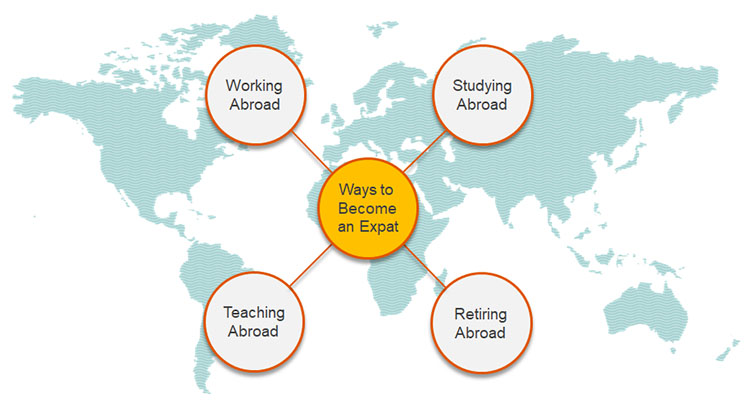
We’ll go through each in detail and share helpful resources and tips so you know where to start.
WORKING ABROAD
Unless you are a retiree or just blessed with a very healthy bank account, you’re going to need to work in your new country. And often enough, you’re going to need a work visa (don’t worry, we’ll cover visas more in Chapter 3).
There are many ways to find a job overseas:
Finding a full-time job yourself
There are lots of websites out there that make it easy to find and apply for a position overseas. Here are some of our favorites:
-
-
-
- Jobbatical – Jobbatical is a relatively new site that posts jobs around the world, primarily for startups looking for talent that they can’t get locally. You’ll see opportunities for developers, designers, sales execs, customer service people, and more in countries like Thailand, Estonia, Hungary, Malaysia, Belgium, Australia, and Italy.
- ExpatCareers – ExpatCareers has a broad range of job types on its site and lets you search by region (i.e. Asia) or country.
- ExpatsDirect – This is another job site focused on expatriate roles.
- NGOJobBoard – If you want to work for a non-governmental organization (NGO), this site lists jobs around the world.
- Jobs in Africa – The aptly named Jobs in Africa website focuses exclusively on jobs on the African continent. You’ll primarily find roles suited to mid-level and senior managers.
- Expat Jobs China – This website exclusively lists opportunities around China, ranging from English teachers to executive positions.
- Work From Home Jobs – This 3rd party site aggregates work from home jobs so you can work and live anywhere in the world.
-
-
Finding a temporary job
Some countries offer short-term visas for certain jobs, such as bartending or waitressing. However, unlike the full-time jobs we discussed above, some of these temporary jobs have caps on how many hours you can work. You’ll generally need to secure the right visa first and then get a job – these kinds of jobs are hard to apply for from abroad, so most people just move and then start the job search. Because of this, you need to make sure you have enough funds squirreled away to support you during the job hunt.
Get transferred by your current employer
Any multinational organization is going to have opportunities in their overseas locations. In fact, roughly 80% of midsize and large companies currently send professionals abroad.
Some companies require managers to spend time abroad on their way up the career ladder. In others, it might be more on the employee to raise their hand and say it’s something they want to do.
These organizations will sponsor a visa for you, so you don’t have to worry about anything. Most will usually provide a budget to help with your relocation costs.
Contact a recruiter
If you’ve got good experience or have an in-demand skill, you can contact a recruiter that specializes in overseas jobs.
Here are a few recruiters specializing in expatriate jobs:
- International Staffing Consultants – This recruiting firm specializes in international jobs. You can see existing job opportunities on their website.
- Cowan International – This recruiter also focuses on expatriate and repatriate roles. You can search their existing job opportunities on this site as well.
- Global Expat Recruiting – This firm focuses exclusively on executives in the hospitality industry. Their website provides information on candidate requirements and the application process.
RETIRING ABROAD
Find cities that fit the lifestyle you want and have a cost of living that will allow you to live comfortably. If you are a British Citizen then consider what to do with your pension before you move overseas.
Check out resources like our Global City Guides to find cities that work well for you. Be sure to consider quality of life, cost of living and weather.
Many countries make it easy for retirees to move there – and even become citizens – if you can prove you’ll be able to support yourself. You can see several of these retirement havens in our list of the 10 Easiest Countries to Get a Second Residency.
STUDYING ABROAD
Studying abroad, whether it’s just for a semester, a year, or for an entire degree, is hugely popular. 4.3 million students study abroad every year.1 In America alone, nearly 300,000 students head to another country for studies.
When you’re young, with nothing major tying you to one place, it’s a great time to consider a going abroad for your education. It will look good on your resume/CV as well as introduce you to new people and cultures.
You can look up Study Abroad or International Programs on your school’s website or your schools Admissions team for more information.
Important things to consider are:
Where do you want to go?
These days you can pick one country to stay in or choose a program that takes you to many countries.
Is the overseas program approved by your school?
You don’t want to spend a bunch of money studying overseas and then find out your school won’t accept the credits. Make sure you check with your school before signing up for any programs.
Can you afford it?
If the study abroad program doesn’t include housing, make sure you’ll be able to afford a place to live – particularly in a global, expensive city like London or Paris.
Check out these helpful sites for more details: StudyAbroad, GoAbroad
TEACHING ABROAD
One surefire way of living abroad (and getting paid to do it) is to teach.
There are international schools around the world looking for good teachers, and they’ll often pay for relocation.
The most commonly sought after type of teacher is one who can teach English to non-native speakers. Besides schools you’ll often find local language training businesses on the hunt for teachers.
To do this, you’ll likely need to get one of two certifications: TESOL (Teaching English to Speakers of Other Languages) or a TEFL (Teaching English as a Foreign Language). These can cost several hundred dollars.
Here are two great sites where you can find teaching jobs overseas:
- Teachaway – This site offers a lot more than just English as a Second Language teaching assignments. You can find teaching roles for any subject or age range. It clearly lays out the salary and benefits you’d get, which makes it easy to decide whether to apply or not.
- Footprints Recruiting – This site makes it easy to search for jobs teaching abroad by region, country, and qualifications required. It also shows salary and benefits so you don’t waste your time applying for something you don’t want.
* * *
Chapter 3:
Getting a visa
Depending on your destination country, getting a visa can be one of the toughest and most expensive parts of moving abroad. It’s also potentially confusing – the United States alone has 185 different types of visas.
While some expats handle the visa application process on their own, it’s a good idea to hire a skilled immigration attorney if you can afford it.
While every country is different in the types of visas available, most have several main categories of visa:
Tourist and Business Visitor
Many countries don’t require any kind of visa if you’re just visiting on vacation or a business trip, but some do. These usually have an explicit amount of time you’re permitted to be in the country.
Family-sponsored
If you have a spouse or other close family member who is legally in the country, many governments have visas for you.
Employer-sponsored
Your chances of getting a full-time work visa are better if you have skills in high-demand in that country. For example, several years ago Australia’s economy and was booming and they were practically handing out high-skilled visas to people with IT experience; more recently they’ve been targeting electricians.
Investor
Many countries open their doors to people who have money because they want that money within their own borders. Investor visa programs vary by country. For example, to qualify for this visa in the United States, you must invest between $500,00 and $1 million in a U.S. business that employees 10 U.S. workers. In the United Kingdom, the entry point is higher: you must invest £2 million in UK companies and investing more speeds up the timeline for applying for permanent residency.
Retiree
Many countries offer special visas for retirees provided they can prove sufficient income to support themselves.
For instance, Uruguay offers a “Rentista Visa” if you can show income of $1,500/month. South Africa has a “Retiree Permanent Residency Visa” if you have income of $3,400 /month.
Other
Yes, an Other category is quite vague, but it covers all the unique visas countries may offer when they want to focus on a certain industry or skillset.
For example, the Netherlands is offering one-year visas to entrepreneurs and scientists, and you can extend the visa if you want to stay longer. France has also created a similar visa program for tech entrepreneurs.
And Germany has an ‘artist visa’, though you must be a freelancer to qualify for this visa. But if you have an in-demand skillset, like programming or design, you shouldn’t have too much trouble getting contract work to support yourself.
* * *
Chapter 4:
Planning your budget
Nothing is more disheartening than moving to your dream location only to realize you can’t afford it. We’ll walk you through the major things you need to think about to determine the lifestyle you can afford.
Cost of Living
Cost of living can vary drastically between cities and it’s important to understand whether you’re going somewhere more or less expensive. Fortunately, there are free resources you can use to compare cost of living.
Expatistan is our favorite one thanks to its easy-to-use interface. You just enter where you’re moving to and where you’re currently living and it shows you whether things like food, housing, and clothes are more expensive or less expensive, and by how much. It also gives an overall number.
For example, if I’m moving from Los Angeles to Sydney, Australia, then according to Expatistan Sydney is 14% more expensive overall. That means that if I earn USD $100,000 in Los Angeles, I’ll need to earn the equivalent of USD $114,000 to maintain a similar lifestyle in Sydney.
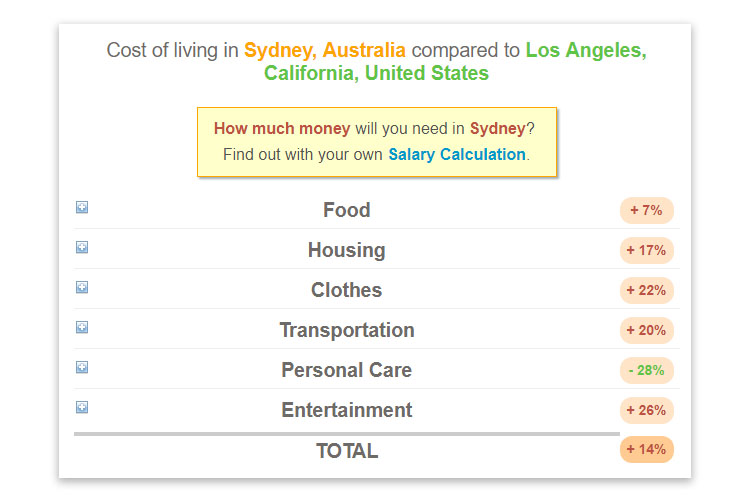
And if I were moving to Geneva, I’d need to earn the equivalent of USD $134,000 for a similar lifestyle.
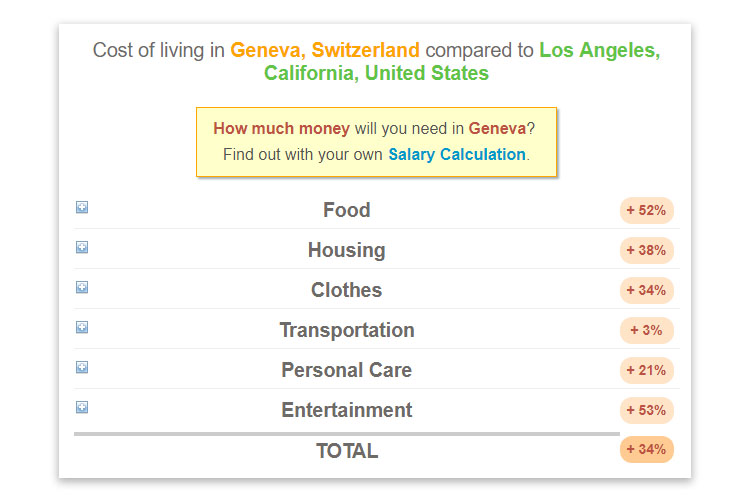
If your company is relocating you, they may provide this kind of comparison to justify a change in salary. Even so, make sure you do your homework. You’d be pretty unhappy if you moved to Geneva and kept the same USD $100,000 salary.
On the other hand, if you’re moving to Mexico City, which is 50% cheaper than Los Angeles, then keeping a USD $100,000 salary would be awesome.
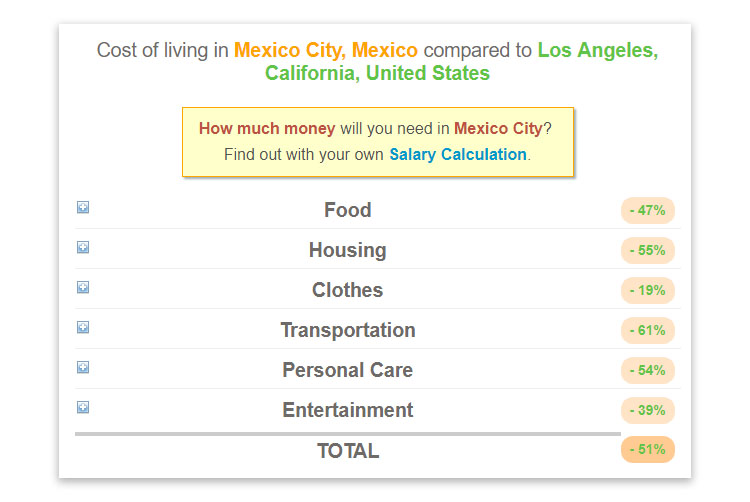
One word of caution when using any cost of living calculator, however: the comparison they give you is at the city level. As you’ve no doubt seen in your own city, cost of living can vary significantly from one part of the city to another.
Guess what that means for our Mexico City example? Even though it’s cheaper overall than LA, the nicer neighborhoods (i.e. the neighborhoods that often attract expats) are just as expensive and in some cases more expensive than LA neighborhoods.
You also need to figure out if there are new expenses you’ll incur. For example, if you have children and need to put them in an international school, that can be very expensive. So be sure to consider all the factors that make up your standard of living when creating your budget for your international move.
Let’s explore a few other budget considerations when preparing for your move abroad:
Your personal relocation costs
You’ll need a flight (and potentially excess baggage) to get to your new country.
Temporary housing costs
Many people forget to factor in temporary living costs when they think about how much an international move costs. The likelihood of you and your shipment arriving at your destination at the same time is low. It is wise to consider temporary housing options like a hotel or furnished housing during this time. Airbnb is a good option to consider. Factor these costs into your overall budget.
Moving costs
If you decide to take your things with you, that can cost thousands of dollars depending on how much you’re shipping and how far the destination is. We’ll talk more about moving your stuff in the next chapter.
Travel budget
The other thing to consider is whether you’ll have increased travel costs. This could be for a couple different reasons.
First, many people move abroad to explore their new country and region. For example, if you move to Europe, you might spend time taking trips to other countries. If you move to Hong Kong, you might end up visiting Japan, Thailand, and other nearby countries. There’s a lot to explore, so you may end up spending more on travel than you do at home.
Second, you’ve left your friends and family behind and will want to visit. Going home for the holidays is a lot more expensive when it’s an international flight.
* * *
Chapter 5:
Moving your stuff
If you don’t have any furniture worth moving to your new country, then you’ll have a fairly simple move: just pack some duffle bags with clothes and hop on a plane.
But many of us have things we want to take, whether it’s furniture, books, dishes, or family keepsakes to remind us of home. In that case, you’ll need to hire an international mover, which can be one of the more expensive aspects of relocating abroad.
Below are some sample costs for GoodMigrations’ customers. The move size is a rough indicator of how much stuff is being relocated, but the amount of stuff in one home may be way more, or less, than a similarly sized home.
All costs below are USD.
Move Size: No furniture; just boxes
- Bergen, Norway to Dublin, Ireland – $384
- Las Vegas to Dubai – $1,821
- Los Angeles to London – $3,844
- San Francisco to Berlin, Germany – $1,811
Move Size: Studio/1 Bedroom Apartment
- Boston to Denmark – $3,865
- Finland to Irvine, California – $6,516
- New York City to Buenos Aires, Argentina – $8,064
- New York City to London – $2,352
- New York City to Sydney, Australia – $7,284
- San Francisco to Melbourne, Australia – $6,370
- The Hague, Netherlands to London – $2,424
Move Size: 2 Bedroom Apartment
- Bangalore, India to Sydney, Australia – $5,250
- New York City to Sydney, Australia – $8,322
- Western Australia to Honolulu, Hawaii – $9,352
Move Size: 3 Bedroom Apartment
- Vancouver, Canada to Melbourne, Australia – $8,350
Move Size: 2 Bedroom House
- Portland, Oregon to Lille, France – $5,749
- San Jose, California to Moscow, Russia – $11,853
- Singapore to Dubai – $3,400
Move Size: 3+ Bedroom House
- Johannesburg, South Africa to Sydney, Australia – $6,100
- Toronto, Canada to Hamburg, Germany – $6,490
- West Palm Beach, Florida to Belo Horizonte, Brazil – $11,820
You will get a clearer idea of what your actual moving costs will be when you work with your moving company or GoodMigrations to get a quote and an in-home survey.
What goes into calculating shipping costs?
Where you’re moving to
This one seems obvious, right? Where you’re moving to plays a big role in how much the move costs. Moving from New York City to London will be cheaper than moving to Tokyo.
The size and weight of your belongings
Unlike statewide movers, which determine the cost of your move based only on how much your things weigh, international moving companies calculate the cost of moving your belongings overseas based on the weight and size of your things after they have been packed in boxes.
As a result, initial estimates you get may not be exact if companies forget to factor in how the weight of shipping materials will affect the cost of moving internationally. However, this will be accurately calculated after your shipment has been packed and picked up.
Depending on the size of your shipment will determine the size of your shipping container. Your international moving coming will choose the best fit for your shipment. The two most commonly used containers are a 20ft and a 40ft.
The international moving services you need
The cost of your international move varies greatly depending on the services you request. Most international moving companies offer a variety of services. A full service moving company will include many of these services in their quote. This will include:
- Packing and unpacking
- Packing materials
- Inland freight
- Loading and delivery options
- Port to Port
- Port to Door/Door to Port
- Door to Door
- Preparation of inventory
- Export documentation
- Normal customs clearance
Method of shipment is also important
Which method you choose will greatly impact the cost of your move.
- Land – Trucks and rail are the two main types of shipping by land. This is obviously only an option for domestic and non-ocean crossing shipments. The costs and speed are both moderate.
- Sea Freight – Also known as container shipping, is by far the cheapest way to ship internationally but is also the slowest. Depending on the route this could take anywhere from several days to several months.
- Air Freight – This shipping method is by far the most expensive way to ship. An air shipment can cost 10x that of a sea freight. Unless, cost is not important and timing is urgent, it is highly recommended to use bulk shipping via sea freight.
Ease of access to your apartment or home is also factored in to determine cost. Be sure to discuss this with your mover either before or during your in-home survey.
What other costs are often associated with moving your stuff?
Insurance and Storage
It is highly recommended to get insurance for your shipment overseas. There are several insurance options but the safest and most comprehensive is “all risk.” This provides complete coverage in case of loss or damage to any part of your shipment.
If your arrival date to your destination is undetermined then you may also need to budget for additional storage. Some moving companies offer first 30 days free so be sure to inquire about this.
Transporting your automobile
If you’re thinking about shipping your car, you should determine whether it’s worth it. Some countries have hefty taxes on imported automobiles.
But if you do decide to ship it, you have two options. You can ship your automobile in a container or you can choose a roll-on, roll-off shipment (RORO). A container is more expensive and therefore will increase the overall cost of your international move, but it can be the safer route as it protects your car from damage during the trip. In a RORO the vehicle is driven directly onto the vessel and secured to the deck. This is a simple and cost effective method.
Other costs: customs inspections, taxes, and port fees
You can incur additional moving costs if your shipment gets stopped by customs for an inspection. There’s no way of really knowing how much this can cost since it’s dependent on the country and the scope of the inspection, but it can range from hundreds to thousands of dollars. There are things you can do to make it less likely your shipment will be inspected, including having the movers pack your things and making sure you don’t have dirt on anything you’re shipping, like garden equipment or shoes.
Some countries may levy taxes on your shipment, particularly if the shipment left the country and is coming back within a 12 month period.
And there may be port fees as well – some movers include them in their quotes and some don’t, so make sure to ask if Terminal Handling Charges (THC) are included if you don’t see it called out.
A reputable international moving company will be upfront with any costs that aren’t part of the quote, so be sure to do your research and keep an eye out for fake mover reviews that could lead you astray.
* * *
Chapter 6:
Figuring out where to live
If you’re moving to a small beachside town or some mountain retreat, you may not have much choice of where to live. But if you’re heading to a big city, then figuring out where to live in advance is important.
Hopefully you’ve had a chance to visit in advance and get a feel for the areas you like, but you should always make a list of what’s important to you. Below is a cheat sheet you can use for things that most people use to rate their neighborhoods:
| Neighborhood Attribute |
Very important to me |
Important to me |
Somewhat important to me |
Not important to me |
| Good schools | ||||
| Low crime | ||||
| Walkable | ||||
| Good nightlife | ||||
| Lots of restaurants | ||||
| Good transportation | ||||
| Close to work | ||||
| Housing within my budget | ||||
| Residents in my age group | ||||
| Other… |
Once you know what’s important to you, you can better focus your search.
This can require a good bit of homework, but will help you narrow down your focus (London has about 500 neighborhoods, Sydney has 630 suburbs, and other cities are similarly sprawling, so you want to narrow down the list of places to explore.)
Many cities have crime maps to figure out safety, and you can use apps like Yelp to see what sort of amenities are around. Additionally, most cities have public transportation maps and schedules so you can see how robust transit is in various parts.
Our Neighborhood Explorer makes this easy for 10 global cities. You can filter based on what’s important to you, including home size and cost, who lives there, amenities, and location.
* * *
Chapter 7:
Finding a home
Once you’ve figured out which neighborhood or neighborhood you want to live in, you’ll need to find a home.
Below are property search portals for many countries around the world. These are good places to start your hunt for a home:
| North & Central America | ||
| Belize Canada |
Costa Rica Mexico |
Panama United States |
| South America | ||
| Argentina Brazil Chile |
Colombia Ecuador |
Peru Uruguay |
| Europe | ||
| Belgium Croatia Czech Republic Denmark France Germany |
Greece Ireland Italy Luxembourg Netherlands |
Portugal Spain Sweden Switzerland United Kingdom |
| Asia & Oceania | ||
| Australia Fiji Hong Kong India |
Indonesia Japan Malaysia New Zealand |
Philippines Singapore Sri Lanka Thailand |
| Middle East & Africa | ||
| Botswana Egypt Israel Jordan |
Kenya Morocco Namibia Oman |
Qatar Saudi Arabia South Africa United Arab Emirates |
Buying or Renting?
Unless you’ve spent extensive time in your new city before moving, we recommend getting temporary accommodations before signing a long-term lease or buying a property.
There are furnished corporate apartments available in most places, but they’ll be expensive. If you want a more affordable option, you can find short term rentals on websites like Airbnb and Craigslist.
Whether you buy or rent really depends on how long you plan to stay. If you envision your time abroad as a temporary move, then renting will be simpler. But if you plan on staying indefinitely, or have retired abroad, then buying may be more cost effective in the long run.
If you’re buying, it’s important to understand your property rights if you’re not a citizen.
For a number of global cities, our City Guides tell you what the property market is like and how to rent (or buy) a property.
* * *
Chapter 8:
Healthcare abroad
In some places, securing health insurance may be a requirement for getting your visa approved. Even if it’s not, you’ll want to make sure you know you’ll be covered if you get sick or have an accident. You should also make sure you’re ready for the move medically.
Prepping before you move
If you’re moving to certain countries, you may need additional vaccinations. The U.S. Centers for Disease Control and Prevention website has a great tool to find what vaccinations are recommended. Just enter the country you’re moving to in the Where are you going? dropdown menu, answer the What kind of traveler are you? question (or leave blank if none apply), and click Go.
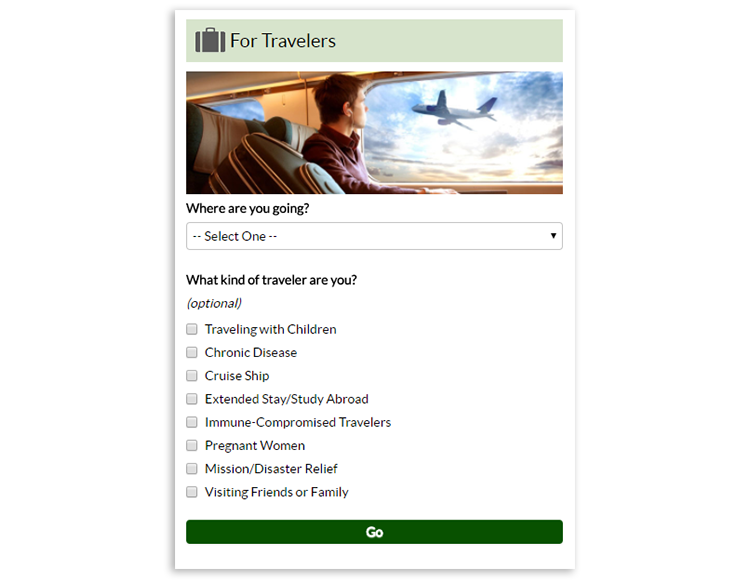
The results will show you which recommendations everyone should have, as well as other recommendations based on where in the country you’ll be and factors such as age or pre-existing condition.
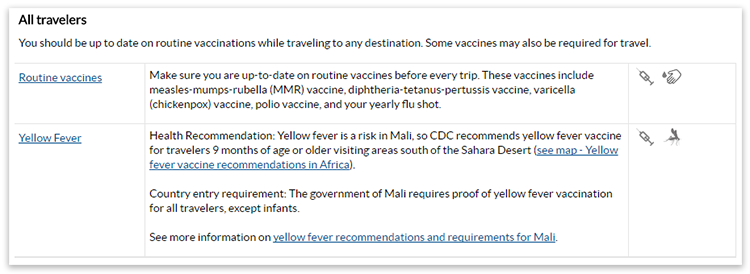
You should also make sure you have a supply of prescriptions to last you until your health coverage starts and you’re able to find a doctor. It’s a good idea to make sure your new country has the same medication available, and if it doesn’t, see what the alternatives are and make sure your doctor says they’re okay.
Getting health insurance
Many countries around the world have national healthcare. For example, the UK has the National Health Service (NHS) and Australia has Medicare.
However, oftentimes this coverage doesn’t apply to people who aren’t citizens. (The big exception to this is the EU, since countries have reciprocity agreements with each other.) This means you’ll need to find your own health insurance, even if your employer is sponsoring your visa.
In fact, securing health insurance may be a requirement for having your visa approved. When this is the case, you can typically arrange for the health insurance coverage to start on the day you expect to be in the country so you’re not paying for coverage before you actually arrive (you can update the start date for coverage if your arrival date changes). You’ll need to get a letter from the insurer confirming your coverage to provide to the government visa agency.
There are several international health insurance companies out there, offering a range of coverage and prices. Here are some of the big ones:
You can also visit BrokerFish to compare plans from multiple providers at once. You can customize what sort of coverage you’re looking for, as well as the monthly premium you can afford:
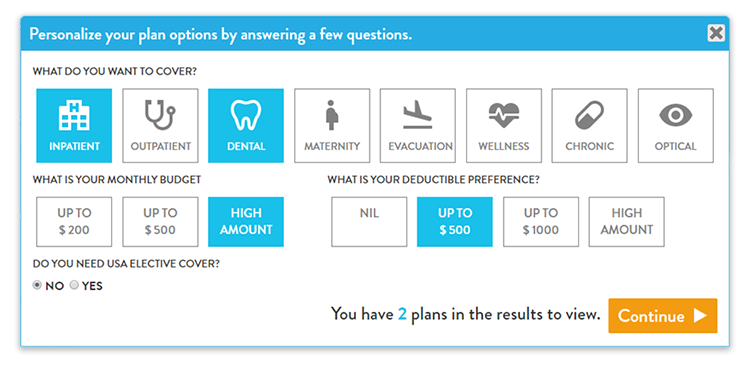
And BrokerFish shows you all the providers that meet your criteria:

You can find more tips on getting expat health insurance from our interview with the experts.
* * *
Chapter 9:
Educating your child overseas
If you have children moving overseas with you, you’ll have to make the important decision of whether to enroll them in a local school or an international school. There are pros can cons to each and the grid below makes it easy to compare:
| Area |
Local School |
International School |
| Curriculum | Due to different education approaches around the world, there’s a good chance the local school curriculum will not match your home country’s curriculum. | Major cities often have international schools catering to specific nationalities, so your child will be following the same curriculum from your home country. |
| Language | If the local population speaks a different language than you, that can be a challenge for your child. And some local schools require students to speak the language if they want to enroll. For example, in Dutch schools all students must be able to speak Dutch.
On the other hand, however, these schools offer an opportunity for your child to quickly become fluent in the new language.
|
Your child will be able to speak his/her native language. |
| Location | Chances are there are plenty of local schools near your home, regardless of where you’re living in your new country. | International schools tend to only be found in global cities and there’s typically only 1 or 2 in a city catering to certain nationalities. For example, Hong Kong only has one French-curriculum school. This can mean you’ll be spending a lot of time taking your child to and from school. |
| Quality | The standards of education vary around the world. For instance, Singapore is known for having a world class education system. Other countries don’t have good schools. | Most international schools are known for having strong academics. |
| Cost | Many local schools are free, though some charge a fee for expatriate students. | International schools come with a range of prices, but are typically expensive. Some can cost tens of thousands of dollars a year. |
| Space | There usually isn’t an issue with local schools having enough spots for students, though some more popular schools do get full. | In some cities, international schools have little to no space for new students. It’s best to contact the school of your choice as soon as you learn you could be moving abroad. |
| Culture | Your child will be immersed in the local culture, which will help them feel at home quickly. | Your child will, for the most part, be engaging with students from a similar background. |
* * *
Chapter 10:
Meeting people
The reason that many expat stints fail is due to a lack of support. It’s hard to leave a place you know and your friends and family and move to a new country no matter how enthusiastic you are. One of the most important things to do to make your move a success is to build a new network of friends.
There are lots of ways to meet new people, but here are a few of the best:
Expat Forums
Hopefully you’ll make friends with locals as well, but meeting other expats (particularly from your home country) is an easy way to instantly have something in common. And it can feel good to reminisce about where you came from.
Here are some of the big expat forums around the world:
- ToyTown – This is Germany’s largest English-speaking expat forum.
- Glocals – This is an active group in Switzerland that often hosts in-person happy hours and activities.
- British Expats – Focused on helping British expats around the world, this forum has been around since 2000.
- InterNations – InterNations has become the juggernaut of expat forums since they cover just about every country in the world. They’re also focused on bringing expats together in person and host events (usually monthly) in most cities.
Meetup
Meetup is a website where you can find in-person events in your city. It’s available in just about every country, so chances are it’s available in the city you’re moving to. You’ll find meetups for just about any interest, from coding to sports to expat groups. It’s a great way to meet people socially or professionally. They also have a smartphone app.
Facebook Groups
There are some big expat groups that are very active on Facebook. You can join before you move, so you can start to “meet” people before you even land. Some groups are also great places to buy things from expats leaving the country. The best way to find a group is to login to Facebook and search for the term “expat” or search for the city name with expat after it:

* * *
Chapter 11:
What happens after
you move abroad?
Living abroad changes you. How much it changes you depends on how long you’ve lived away from your home country, and how different the culture you’re immersed in is. Here are a few things to be prepared for so you know what to expect:
- The vacation ends and eventually it just becomes home. Your first few weeks feel like a vacation. That soon wears off as the rhythm of a daily routine sets in, particularly if you’re working.
- You’ll likely have a 6 month slump. Once the rhythm sets in so does something else: reality. You’re thousands of miles from home with a new home, new job, and no friends. You panic. This is normal – many expats go through it (we did!) – and it does seem to last for about 6 months for many people. For most expats, it passes once you’ve got a network of friends and colleagues and are feeling more comfortable in your new environment.
- “Home” won’t feel like home anymore. After enough time abroad, where you came from no longer feels like home when you visit.
- Friends and family won’t be as relatable. After all, you’re having this incredible experience that they’re not a part of. Still, it’s always nice to come home and reminisce with your loved ones.
- Expats move. A lot. This means you’ll lose lots of newfound friends as they return home or move to the next country.
- You’ll likely miss important events. Living abroad means you won’t be able to attend every wedding, birthday, or funeral since trips back home can be time consuming and expensive.
If this all sounds rather depressing, don’t forget about the other side of expat life. You’ll be immersed in a new culture, you’ll be exploring a new part of the world, you’ll be making new friends, and you’ll be growing as an individual. In short, it’s an incredible, life changing experience!
If you talk to most expats, they wouldn’t trade this experience for anything. But you don’t have to take it from us; see what one of our expert expats thinks about his move from Belgium to Sydney, Australia:
“I moved here in 2009 without having visited Australia before and I have been in love ever since. Regardless of whether you stroll over to the Opera House, take a ferry to Manly, or just hang on your balcony and look out at the water, it feels like you are on holiday all the time here. Sydney’s outdoor lifestyle and great climate make it a unique city to live and work in!”
Kris Severijns
* * *
Well, that concludes our Ultimate Guide to Moving Abroad. If you’re thinking about moving internationally we hope this guide was helpful for you. If there’s anything we didn’t cover that you’d like to know, or you just want to say hi, please get in touch with us.
Happy moving!

